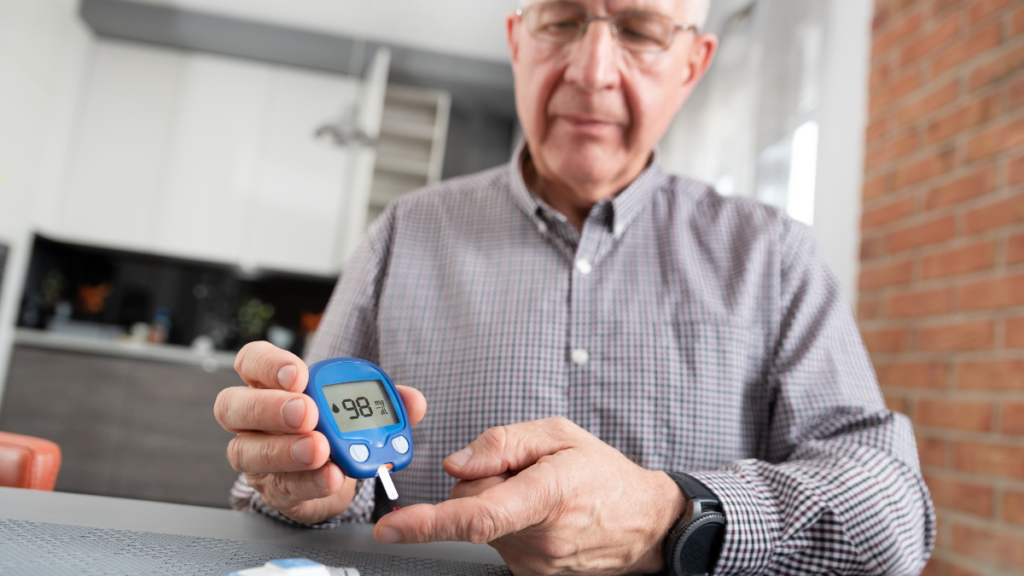
Diabetic Seniors Needn’t Lose Hope – Here are Some Tips to Help Them Cope
( March 28 is American Diabetes Alert Day )
According to the CDC’s National Diabetes Statistics Report, 11.3% of the United States population or a total of 37.3 million people have diabetes, with diabetes being the 7th leading cause of death in the US. Of these diabetes cases, 90-95% are diagnosed as type 2 diabetes.
What’s more, the report estimates that 1 in 4 seniors aged 65 years or older have diabetes.
With diabetes affecting such a large percentage of the population, it’s important to know how to manage the condition, especially if you’re a senior. Diabetes can lead to serious health complications, so it’s essential to be proactive about your health and work closely with your doctor to develop a treatment plan. By understanding the prevalence of diabetes in seniors and taking steps to manage the condition, you can help keep yourself healthy and reduce your risk of complications.
What is diabetes?
Diabetes is a condition in which the body does not properly process glucose, or blood sugar. Glucose is the main source of energy for the body, and when diabetes is present, it can cause serious health problems. There are two main types of diabetes: Type 1 diabetes and Type 2 diabetes. Type 1 diabetes occurs when the body does not produce insulin, and Type 2 diabetes occurs when the body does not use insulin properly.
Symptoms of diabetes
If you experience any of these symptoms, it is important to contact your doctor so that you can be diagnosed and treated.
- Feeling very thirsty
- Feeling very tired
- Drastic Weight loss
- Blurry vision
- Slow healing cuts and bruises
- Tingling or numbness in the hands or feet
- Frequent infections
Tips to cope up with diabetes for seniors
There are many ways to manage diabetes, and the best way to do so will vary depending on the individual. However, there are some general tips that can help seniors cope with diabetes.
Lifestyle changes
Making some lifestyle changes can help seniors manage diabetes. Some lifestyle changes that can help include:
Eating a healthy diet
Eating a healthy diet is one of the most important things you can do to manage diabetes. A healthy diet includes plenty of vegetables, fruits, whole grains, and lean protein. It is also important to limit processed foods, sugary drinks, and alcohol.
Exercising regularly
Exercising regularly is another important way to manage diabetes. Exercise can help to lower blood sugar levels and improve insulin sensitivity. Seniors should aim for at least 30 minutes of moderate exercise on most days of the week.
Quitting smoking
Smoking can make diabetes worse, so it is important for seniors to quit if they smoke. Quitting smoking can be difficult, but there are many resources available to help, including counseling and medication.
Managing stress
Stress can make diabetes worse, so it is important to find ways to manage stress. Some ways to manage stress include exercise, meditation, and spending time with friends and family.
Maintaining a healthy weight
Maintaining a healthy weight is important for all seniors, but it is especially important for those with diabetes. Losing even a small amount of weight can help to improve blood sugar control.
Medications
In addition to lifestyle changes, seniors with diabetes may also need to take medication to manage their condition. Some common diabetes medications include insulin, metformin, and sulfonylureas. Seniors should work with their doctor to find the medication that is right for them.
Monitoring blood sugar levels
Checking blood sugar levels regularly is an important part of managing diabetes. It can help to catch problems early and make sure that the diabetes is under control. Seniors should check their blood sugar levels at least once a day. There are testing kits available that make it easy to do this at home like Glucometers.
When to see a doctor
If you have diabetes, it is important to see your doctor regularly. Your doctor can provide diabetes education, monitor diabetes control, and help to identify any problems early on. It is also important to seek medical attention immediately if you experience any diabetes-related symptoms, such as low blood sugar levels or ketoacidosis.
In-home caregivers can also be beneficial
An in-home caregiver can help with diabetes self-care, such as monitoring blood sugar levels and administering insulin injections. In-home caregivers can also provide transportation to doctor’s appointments and help with grocery shopping and meal planning. In addition, they also provide companionship and can help with things around the house, such as light housekeeping and laundry.
Diabetes is a serious health concern for seniors, but it doesn’t have to be overwhelming. There are many ways to manage diabetes, and with the help of a doctor and some lifestyle changes, seniors can live healthy and happy lives. Don’t try to tackle this on your own. These tips will definitely help reduce the risk of contracting diabetes, but they are not intended to replace the care and guidance of your health professional. If you experience any symptoms like those listed above, or others that make you uncomfortable, your best bet is to visit your general practitioner and get a health screening. We want you to enjoy your golden years, enjoying the time with family, and whatever hobbies you find enjoyable.
Silver Companions specializes in senior care, including diabetes and other conditions requiring regular care, and we can help to make the diabetes management process easier with our in-home care services. Visit our website at www.silvercompanions.com, give us a call at (678) 494-8129, or email us at info@silvercompanions.com to learn more about how we can help.





